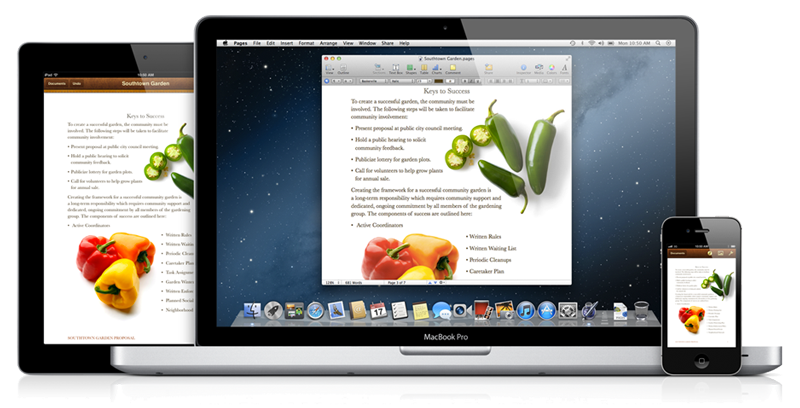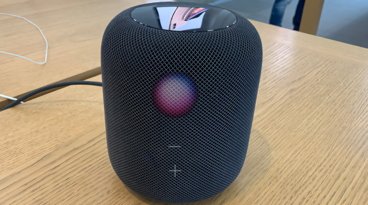Tim Cook admits Apple may further converge iOS & OS X, Macs could run on ARM CPUs
Last updated
Cook's comments come from a new interview with The Wall Street Journal, in which he discussed the future of the Mac platform with the forthcoming Mountain Lion operating system update. The CEO said he already views iOS and OS X as "one with incremental functionality," though he expects both to continue to coexist.
As for whether they could converge even more, and further blur the lines between the two operating systems, Cook reportedly didn't rule out that option. And he also admitted that Macs could eventually run the same chips as the iPhone and iPad — whether ARM comes to the Mac, or iOS devices transition to Intel processors.
"We think about everything," Cook said. "We don't close things off."
Mountain Lion, set to be released later this summer, represents an even closer unification of OS X and iOS, as many features found on the iPad will transition over to the Mac. They include Notification Center and iCloud, as well as specific applications like Messages, Reminders and Game Center.
Even existing OS X applications have been renamed to match with their iOS counterparts, as Address Book will become Contacts, and iCal will be known as Calendar. The changes follow a plan set in motion with last year's release of OS X 10.7 Lion, which was heralded for bringing iPad and iOS features "Back to the Mac," as Apple promoted it.
Thursday's report from the Journal also hinted at Apple's rumored upcoming television set when mentioning the AirPlay Mirroring feature that will be included in Mountain Lion, and will allow users to wirelessly broadcast their Mac screen to an Apple TV on the same network. It noted that the addition of AirPlay is "highly strategic for Apple, as it contemplates new technologies for the living room."
Cook also made note of how the Mac is gaining traction in China, where the iPhone has been a resounding success and consumers are now looking to Apple's other products. Enhanced support in Mountain Lion for Chinese-language users was one addition highlighted by Apple in Thursday's announcement, as OS X 10.8 will include Baidu search in Safari, compatibility with e-mail services like QQ, 126 and 163, and Share Sheets connectivity with Youku and Toudou.
Finally, Cook declined to hint at future plans for Mac hardware, though he did praise the MacBook Air as one device that the rest of the PC industry is desperately trying to copy. AppleInsider indicated last week that Apple is planning to radically redesign its MacBook Pro lineup this year with a new lineup that will look much more like the current MacBook Air offerings.
 Sam Oliver
Sam Oliver














 Amber Neely
Amber Neely
 Thomas Sibilly
Thomas Sibilly
 AppleInsider Staff
AppleInsider Staff
 William Gallagher
William Gallagher
 Malcolm Owen
Malcolm Owen
 Christine McKee
Christine McKee









106 Comments
Hmmmm..... TMI, Cook, TMI.
I am not a fan of iOS on a Mac PC.
Making the OS stupid proof.
Fascinating! I like the integation of iOS on the Mac....just the syncing and Mac App store are amazing!.
The future is, more and more Apple users will have an iphone, iPad and most likely an MBA or even an iMac as well and eventually an Apple TV. And having a "family resemblance" of Apple's devices is the way to go!Also, for those interested, this week's macworld podcast is about mountain lion...very interesting!
http://www.macworld.com/article/1654...n_the_way.html
I almost think it would make more sense for Apple to transition iOS to Intel, down the road of course. ARM works great right now, but has little competition given that Intel fell asleep from ingesting too much money in the 90's and early 21st century.
Correct me if I'm wrong, but LightPeak/Thunderbolt doesn't work on ARM, but would if Apple transitioned to Intel, say 5 years down the road.
I will continue to say that I do see an eventual convergence of the two. Not in the way MS is going with Win 8, that's just a mess, and is a result of them having no credible OS for tablets, and thus, no presence in that space. So they have to force the Metro UI on their users all at once.
Apple doesn't have that problem of course, and so they can take their time.
But what I see is a graduated response from them. In other words, we'll see the same OS, but it will have differing levels depending on the device it will run upon. The simplest will be for phones and Touches, then more will be seen on tablets, and finally, everything will be available on more traditional computers.
This will make for an easy transition between the varying levels of devices, as people should expect. No one will want to fully edit a long, complex document on a phone or Touch, but they may want to look through parts of it and make some notes, and a few corrections. On the iPad, they would want to do more, and should be able to, when on the road. But when used on a notebook or desktop, the full ability should be available, along with all the notes and corrections from the other devices.
The same thing might be done with Keynote, for example. The entire presentation could easily be done on a "computer", or possible even on an iPad, but in reviewing it on their phone, from which the presentation may be given, using Airplay through a projector, they may want to alter backgrounds, and a few other minor matters at the last moment.
Programs, apps, or whatever they will be called will have each more sophisticated, and larger device see a superset of the feature set of the device below it, thus allowing a smooth increase in power where appropriate.
Apple is doing this now, with what we are seeing in Mountain Lion. It just makes sense.